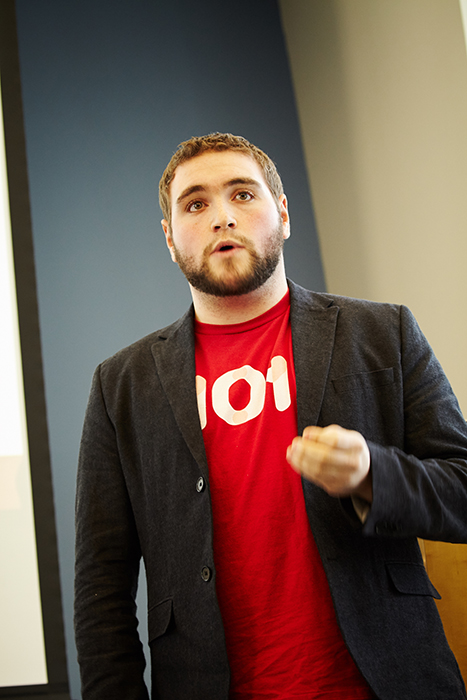Modern Teaching Tools for STEM: An Interview with 101 Founder Justin Weinberg
Written by Vince Ball
Chemistry courses are universally feared by college students across North America. Justin Weinberg is working to help students conquer that fear with an intuitive platform, Chem101. Chem101 is the first in a suite of innovative and interactive teaching tools that are being created by Weinberg’s company, 101.
Chem101 allows chemistry professors to engage with their students through interactive and practical exercises. Students can draw Lewis structures, perform dimensional analysis, write chemical equations, and more, all from their phones and other personal devices during class. It has been so successful with students and educators that Chem101 has been adopted by over 150 chemistry faculty at 125 different colleges and universities.
Chem101 owes its success, in part, to Weinberg’s devotion to teaching. Weinberg, who recently earned his Ph.D. in Chemical Engineering from Carnegie Mellon University, began as a undergraduate chemistry tutor with a passion for teaching others.
In 2010, Weinberg started innovating in higher education by recording his tutoring lessons and packaging them in an app so that students could learn on the fly. This developed into an obsession with getting students away from traditional learning methods and engaging them inside and outside the classroom, the principle behind Chem101.
Weinberg: “I knew as a teacher and a tutor, that in order for students to succeed, they had to sit down and they had to struggle through problems. It’s one thing for them to watch me do a problem, it’s another thing to actually sit down yourself and solve it.”
Weinberg and his co-founder, Igor Belyayev, pitched to investors in Autumn 2015 that he could bring active learning to chemistry students, wherever they were. The pitch resonated with venture capital funds Dreamit, Rough Draft Ventures, and Dorm Room Fund, who agreed to give 101 funding to break into higher education.
The duo turned that capital into the first commercially viable version of Chem101, which was trialed at 8 institutions across the country in Fall 2016. The schools with Chem101 found that 40% of their students were more interested in chemistry, with one institution reporting an almost 200% improvement in chemistry learning gains after introducing the app.
Armed with impressive results, Weinberg set out to pitch 101 more aggressively. This was when Weinberg was introduced to Student Startup Madness.
Weinberg applied to Student Startup Madness in 2016, advanced all the way through the starting field of 64, through the Entrepreneurial 8, and won the competition at South By Southwest in Spring 2017.
The experience provided Weinberg with access to a pitch coach, exposure to venture capitalists in the audience, and industry-leading judges, including Martin Babinec, Laura Chau, and Sandy Khaund. Weinberg also bonded with the other student entrepreneurs at the event, which included Brianna Wolin of Find Your Ditto and Vinesh Kannan of Omnipointment.
Weinberg: “We got a couple of investors who were in the audience [at SSM] and saw the pitch. […] I would also say that my coach was really helpful in connecting me to folks in tech. It was great exposure and obviously it’s great to say I won a pitch competition at South by Southwest.”
101 won Student Startup Madness in Spring 2017. By the Fall of 2017, 42 schools and 61 chemistry faculty were using Chem101.
But, there were challenges along the way. Weinberg faced a venture capital sector tentative to invest in a company geared towards higher education courseware. Weinberg broke the doubt by showing how Chem101 was marketed directly to professors, who were also Weinberg’s peers, in order to work around potential university bureaucracy and red tape. This proved to be a good strategy, and today 101 has raised over $2.2M in angel and venture capital from groups such as Birchmere Ventures, University Ventures, and other leaders from the academic publishing industry.
Weinberg: “We really think about ways that we can remove the typical tediousness and frustration when learning with software and getting the technology out of the way for students so we can enhance their experience learning STEM.”
The success has not drawn down Weinberg’s ambitions. Weinberg aspires to build on Chem101 and form a platform that uses active learning to help students in Biology, Physics, Algebra, and Economics. Weinberg feels there is a need for his brand of teaching, and hopes to fill that need with his overarching solution, a platform simply called 101.
Portions of this interview has been edited for clarity and brevity.
For more stories from student and young founders, sign up for the Student Startup Madness Newsletter, and follow us on Twitter, Facebook, and Instagram.
Are you a student startup? Apply to Student Startup Madness 2018 and compete to pitch on the Student Startup Madness stage at SXSW!



